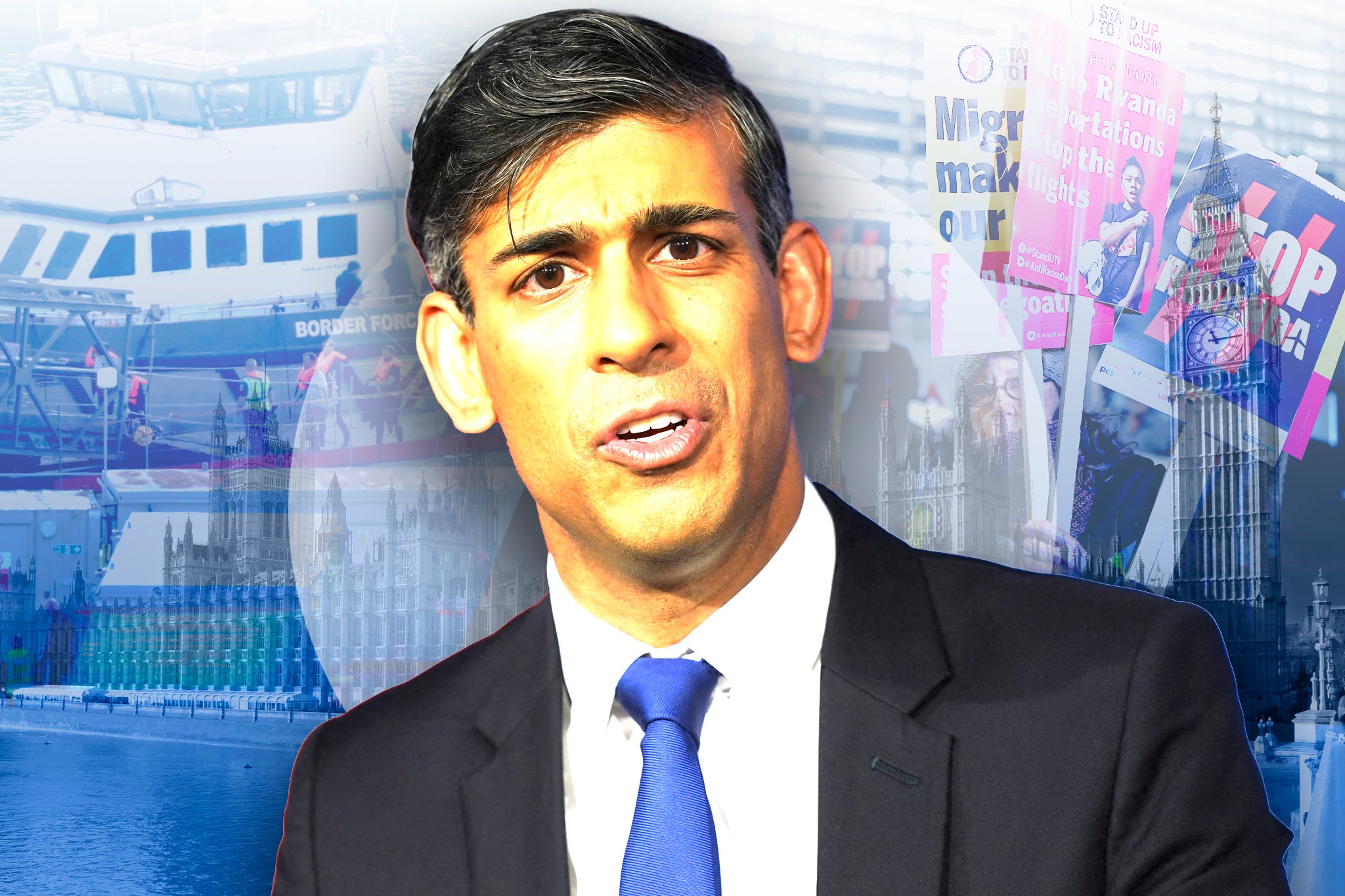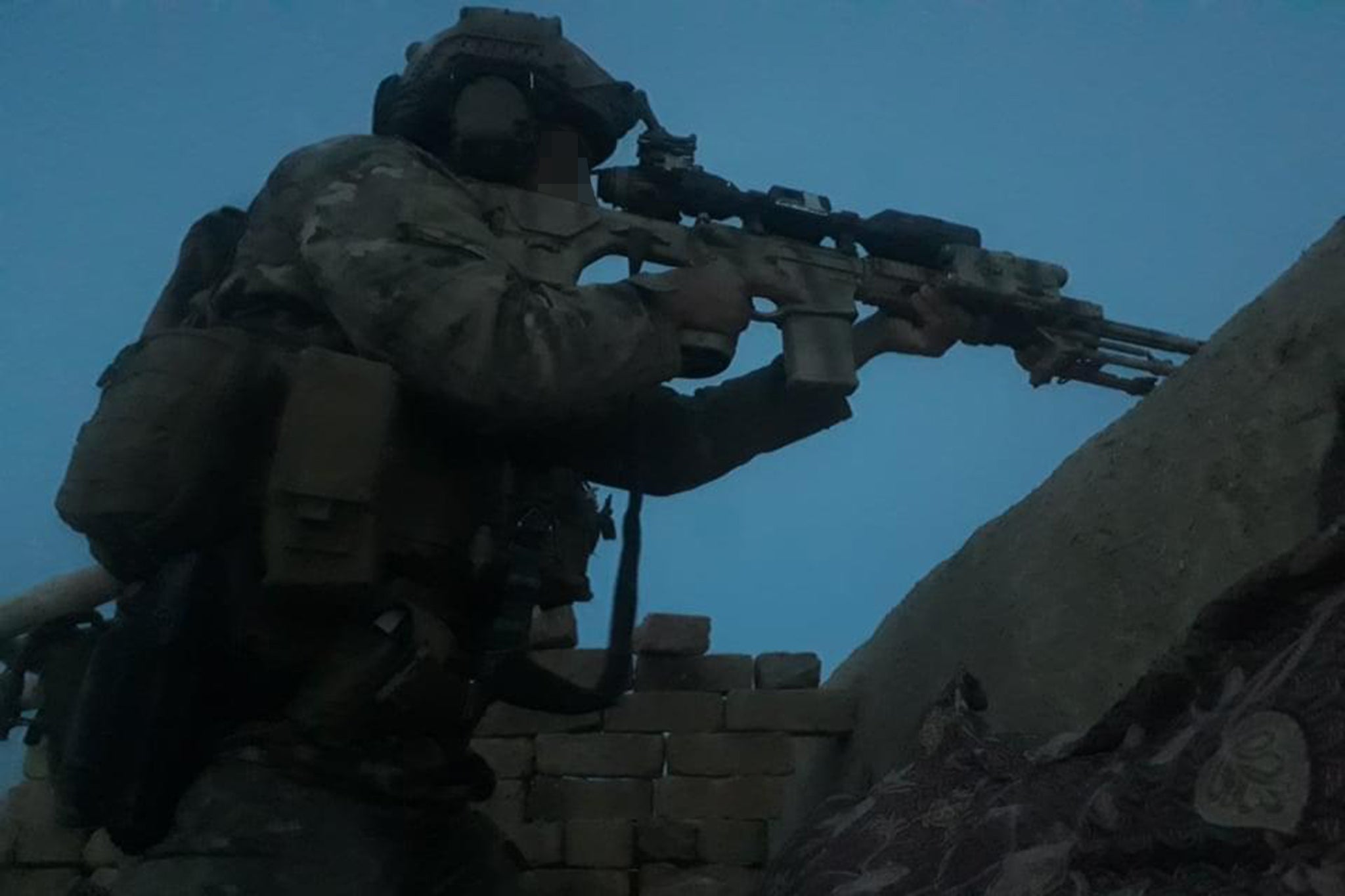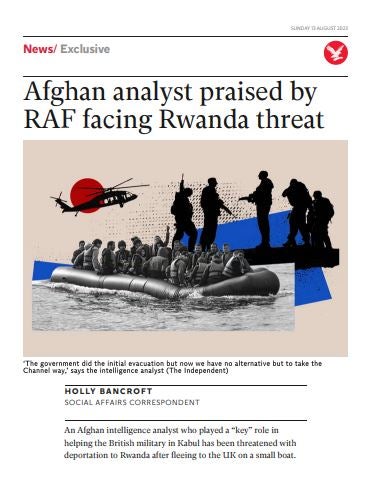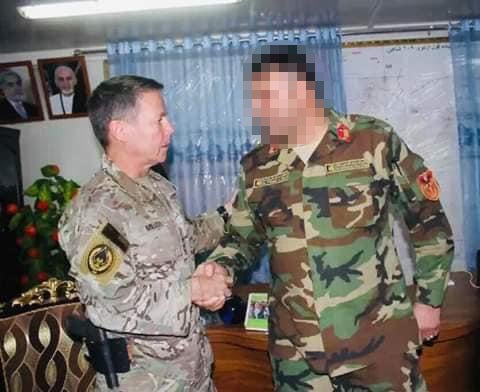Lords tell Sunak: Don’t send Afghan heroes to Rwanda
Two former defence chiefs, ex-defence secretary and US ambassador join our call to stop deportation of Afghans who served with UK forces – as House of Lords tries to force changes to PM’s flagship Rwanda bill
Your support helps us to tell the story
From reproductive rights to climate change to Big Tech, The Independent is on the ground when the story is developing. Whether it's investigating the financials of Elon Musk's pro-Trump PAC or producing our latest documentary, 'The A Word', which shines a light on the American women fighting for reproductive rights, we know how important it is to parse out the facts from the messaging.
At such a critical moment in US history, we need reporters on the ground. Your donation allows us to keep sending journalists to speak to both sides of the story.
The Independent is trusted by Americans across the entire political spectrum. And unlike many other quality news outlets, we choose not to lock Americans out of our reporting and analysis with paywalls. We believe quality journalism should be available to everyone, paid for by those who can afford it.
Your support makes all the difference.Rishi Sunak has been urged to ensure Afghan heroes who helped British forces against the Taliban are not deported to Rwanda, as the House of Lords tries to force a change in his flagship “stop the boats” bill.
Two former chiefs of the defence staff, a former defence secretary and a former British ambassador to the US, are among members who want to add an exemption to the Rwanda bill to stop those who have worked alongside the UK forces and arrive in Britain via unsafe and illegal routes from being sent to the African country.
On Monday, the government suffered a series of defeats to the bill at the hands of peers. The Lords backed a demand that parliament cannot declare Rwanda to be safe until the treaty, with its promised safeguards, is fully implemented.
Tory peer Lord Tugendhat accused the government of behaving like the ruling party in George Orwell's dystopian novel 1984 as the debate in the Lords got under way. Labour former home secretary Lord Blunkett branded the bill “a nonsensical piece of legislation”. The exemption for Afghan military will be debated and voted on on Wednesday.
The call to help those who supported UK forces comes after a series of reports by The Independent which have highlighted the plight of Afghan heroes facing deportation to Rwanda after feeling forced to take dangerous routes to the UK.
One air force pilot who risked his life on combat missions in support of coalition forces was threatened with Rwanda after arriving in Britain on a small boat because he could not wait for help from the government’s Afghan resettlement schemes. That threat has now been removed and he has been granted asylum in Britain after the government was forced into a U-turn by this publication.
Leading lawyer Lord Carlile, the former independent reviewer of terrorism legislation who sits in the Lords, said it was “just, fair and required” to stop such people being deported, adding that there will be a lot of support within the upper chamber to back the amendment. General Sir Richard Dannatt, the former head of the army, also said he backed the move.

The amendment is being brought forward by former Labour defence secretary Lord Browne of Ladyton, who highlighted his concerns with the proposed law by citing four examples of cases uncovered by The Independent.
They include former members of the Afghan special forces units, known as The Triples, who fought alongside and were paid and trained by the UK special forces. One former senior British diplomat said it “beggared belief” that these soldiers, who were forced to flee the Taliban, could face being deported to the east African country after all they had been through.
Under the terms of the Illegal Migration Act, the government is required to remove illegal migrants who entered the country after 20 July 2023, when the act received royal assent. The act also bans ministers from granting asylum to anyone who entered the UK illegally on or after 7 March 2023, when it had its first reading.
The new clause, which is also being proposed by crossbench peers Lord Houghton of Richmond, Lord Stirrup, and Lord Kerr of Kinlochard, would mean that people of any nationality who supported the armed forces overseas in an “exposed or meaningful manner” or who were “employed by or indirectly contracted to provide services to the UK government in an exposed or meaningful manner” would be ineligible for Rwanda deportation. It would also exempt their family members from deportation.

Lord Carlile told The Independent he would support the amendment, adding that those affected would be at risk of being deported back to Afghanistan from Rwanda – further putting their lives in danger.
“If it is put to the vote, there will be a lot of support for not sending people who worked with Britain in Afghanistan to Rwanda – provided peers are satisfied it is drawn in a way which would not allow for people to use the system illegitimately,” he said.
“Obviously, we want to help genuine Afghans who would be in real trouble if, via Rwanda, they were returned to Afghanistan,” he added.
“We have to understand that the House of Lords cannot simply wreck government legislation, we are not trying to do that.



“But if there is something that is just and fair and required, then we will say to the government, ‘this is not acceptable’.”
Gen The Lord Dannatt, former chief of the general staff, also said he supported the amendment, though he wasn’t present in the Lords on Monday.
Tim Willasey-Wilsey, a former diplomat who worked closely with Triples unit 333 and is now a visiting professor at King’s College London, welcomed Lord Browne’s amendment and said that the idea that men and women who had been forced to flee to escape murder in Afghanistan because of their service in the Triples could be sent to Rwanda “beggared belief”.
He added: “It is imperative that the House of Commons should accept Lord Browne’s amendment.”


Julian Lewis, the Conservative MP and former chair of the Commons defence select committee, said: “I’m very sympathetic to rescuing Afghans at risk for having helped the UK Nato/Isaf forces to fight the Taliban.
“Provided that their specific service background can be verified by our MoD and/or individual veterans, it ought to be possible for them to apply to come here from the first safe country they reach, and it should not be necessary for them to make a risky and illegal Channel crossing.”
He said he would look closely at the proposal before backing it.
Examples of those who have been threatened with deportation are an Afghan colonel who worked alongside British troops in joint operations in Helmand province and who arrived in the UK by small boat in September 2022.
The Independent also revealed how an Afghan intelligence analyst who worked in the Office of the National Security Council, a department initially funded by the UK for intelligence sharing, fled to the UK via irregular means because he felt he could not afford to wait for help through official routes.
Another case, highlighted by The Independent and investigative newsroom Lighthouse Reports, detailed how an Afghan special forces sniper who served in the Triples units had come to the UK on a small boat. This soldier has been languishing in a hotel room for 17 months without his asylum case being processed.

The Ministry of Defence is currently conducting a review into the cases of Afghan special forces soldiers who were rejected for relocation to the UK, with defence minister James Heappey admitting some of the decisions were “inconsistent” and “not robust”.
Other amendments being looked at include ones which challenge the government’s assessment that Rwanda is a safe country. One amendment argues that parliament can’t judge Rwanda to be safe until extra measures, required by the UK Supreme Court, such as a monitory committee over asylum decisions, have been fully implemented.
The Supreme Court ruled last year that the government’s plan to send asylum seekers to Rwanda was unlawful. Despite this, Rishi Sunak has brought in new legislation to declare the African country is safe and urged the House of Lords to not “frustrate the will of the people” by blocking his plans.
He has called on peers to pass the bill “as quickly as possible”, intending to get flights airborne by spring.

Join our commenting forum
Join thought-provoking conversations, follow other Independent readers and see their replies
Comments